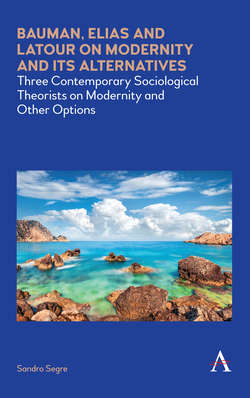Bauman, Elias and Latour on Modernity and Its Alternatives

Реклама. ООО «ЛитРес», ИНН: 7719571260.
Оглавление
Sandro Segre. Bauman, Elias and Latour on Modernity and Its Alternatives
Отрывок из книги
Bauman, Elias and Latour on Modernity and Its Alternatives
Three Contemporary Sociological Theorists on Modernity and Other Options
.....
Only “professional intellectual” can formulate a theory of society and history, as Bauman has argued in a subsequent work (Bauman 1987b: 175). Hence, the intellectuals’ privileged role as interpreters of the proletariat’s historic interest. This role, as intellectuals conceived of it, belongs to the bygone age of modernity, however, as interpretations can no longer in this age impact on social or political reality. As a Bauman’s commentator has stated, however, “what we cannot do, for Bauman, is to translate this interpretation directly into legislation” (Beilharz 2000: 81). Modernity being a failed project (Bauman 1987b: 191), global projects have been abandoned in this postmodern age. Therefore, “no social group or category of the postindustrial world seems to be fit for the role set aside by the history-as-rationalization theory for the ‘agent of Reason’” (Bauman 1987b: 194). Bauman, however, has not relinquished Marxism as a tool for sociological analysis; for a Marxist analysis involves looking for “a class whose sufferings are radical,” whose members are most affected by the “rapidly spreading areas of deprivation” (Bauman 1987a: 9).
As a global society no longer offers stability and security, freedom in today’s world is granted to and enjoyed only by those who possess “skills and resources” (Bauman 1997: 27). These people commit themselves to a lifestyle that is connoted by “looseness of attachment and revocability of engagement” (Bauman 2005:4). They can afford to be the pleasure-seeking and the well-to-do customers of fashionable restaurants and other city amenities. They are the modern-city residents, secure in their fortified and well-policed homes and neighborhoods. Their residential areas are sharply separated from those where the inhabitants of other city areas live, and especially from the poor. Today’s poor are a collateral casualty of our “liquid” times. Bauman finds the “rapidly growing inequality on a global scale replicated “inside virtually every single ‘national society’” (Bauman 1997: 58). “Emerging post-modern circumstances”—signally, “the newly legalized post-modern self-centeredness and indifference”—may be conducive to “new outbursts of savage misanthropy” (Bauman 1991: 260).
.....